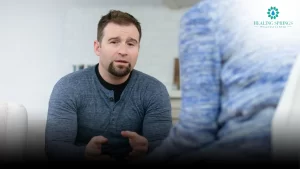
From Panic to Poise: How Therapy Eases Performance Anxiety
Performance anxiety can cause panic, racing thoughts, and fear of judgment. Learn how therapy helps you regain confidence and perform calmly.
Survivors of traumatic situations deserve love and protection, but having a history of abuse can make any relationship feel terrifying and challenging to manage. You may learn to expect danger, betrayal, or potential harm within them. The impact of trauma on a relationship is based on each person’s unique experience, but there are also a few typical responses to relational trauma.
Survivors may feel more vulnerable and unclear about what is safe. Building trust may feel more challenging, and the thought of getting close with others can be unappealing. They may be resistant to engage in honest and open relationships for fear of being deceived or harmed. Staying closed off and guarded can make it difficult for others to feel close to them, denying them the opportunity to form healthy and meaningful bonds.
Many trauma survivors also feel emotionally numb and have trouble feeling or expressing emotions in a relationship. They can feel overwhelmed and over-reactive while being afraid of abandonment at the same time. It can be frightening, confusing, and challenging to experience the effects of trauma in a relationship.
The lack of power over what occurred can make trauma survivors feel the need to control others. Despite any good intentions, trying to sustain control over their lives in this way can result in loved ones feeling smothered.
It may become natural to isolate ourselves completely from others. In efforts to protect ourselves, we end up feeling distant, disconnected, and detached. We might be anxious about burdening others with what we have been through, or, we might not want to deal with it, so we keep it inside.
Enduring a dysfunctional family history or being involved in previous relationship trauma can shape your beliefs about others negatively. These theories shape how we perceive our partner’s actions and words, interpreting them in the worst light. We may continuously monitor the relationship to validate any subconscious beliefs.
Fear of rejection or abandonment may deter you from putting yourself out there to find a healthy relationship or result in rejecting others before they can leave you. You may feel misunderstood, only to result in resentment when your partner doesn’t read your mind.
Trauma can lead to choosing harmful partners and staying with them for too long. We may tolerate disrespectful behavior or make excuses for someone rather than setting boundaries and upholding expectations.
Dysfunctional relationships may seem as if they keep reappearing one after another. The attraction towards abusive or unloving partners is also explained as trauma bonding, making the emotional intensity of a relationship “addicting.”
A history of abuse can often make us more vulnerable to future abuse. We tend to stick to familiar patterns, even if those patterns are toxic or unhealthy. If you’ve ever questioned whether a relationship was love or abuse, then you may have witnessed the power of a trauma bond.
As a unique form of manipulation commonly used by narcissistic partners, trauma bonds include a cycle of intense love and excitement, followed by periods of abuse and mistreatment. The repetitive pattern of being devalued by someone, only to be rewarded later, creates an unhealthy bond between two people.
Trauma bonds keep us in situations that we would immediately see as toxic if someone else was in them.
Anyone in an abusive relationship or experienced traumatic relationships as children may be more prone to these types of bonds. The behavior we witnessed in the past becomes normalized and prepares our nervous system to deal with the cycle, despite the pain it causes. If someone has grown accustomed to chaos, they reject the respectful, honest person for the manipulative, abusive one.
But it’s possible to break the cycle. Healing requires turning our attention inward and discovering what a healthy relationship looks like.

Interpersonal traumas leave their legacy through powerful beliefs and behavior patterns that make it difficult to find real, loving, and authentic relationships. By becoming aware of these patterns, you learn to think differently and start protecting yourself while healing from old, destructive wounds.
Getting a therapist who understands abuse, trauma-bonding, or attachment trauma can help work through the original traumas and begin building a model for a secure, healthy attachment. This can then translate to the way we perceive ourselves and how we interact with others.
We at Healing Springs Wellness Center, are ready to help you on your trauma recovery journey. Let us help you find emotional peace and safety. Schedule a free 15-minute phone consultation for counseling.

Performance anxiety can cause panic, racing thoughts, and fear of judgment. Learn how therapy helps you regain confidence and perform calmly.

Overthinking keeping you stuck? Learn therapist-approved strategies to stop mental spirals, reduce anxiety, and regain clarity in the new year.

Heart palpitations can be a frightening anxiety symptom. Learn why anxiety causes a racing heart and how to regain control in the moment.

Holiday stress can turn into anxiety, insomnia, or panic. Learn the signs, why it happens, and how therapy helps you regain calm and control.